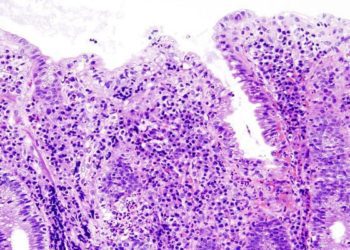HSCT not shown to achieve disease remission in refractory Crohn’s disease
1. Hematopoietic stem cell transplant (HSCT) did not significantly achieve disease remission in patients with refractory Crohn’s disease.
2. More patients who underwent HSCT had a non-significant trend towards better quality of life and less active disease on imaging but also had a significantly higher number of infections than those who did not.
Evidence Rating Level: 1 (Excellent)
Study Rundown: This randomized clinical trial looked at the potential benefit of autologous hematopoietic stem cell transplant (HSCT) for the treatment of Crohn’s disease. Only patients who had a poor quality of life, had failed multiple pharmacological treatments, and whose disease was refractory to surgical interventions, were included in the study. The results showed that there was no statistically significant improvement in disease remission between those who underwent HSCT and those who did not. However, there was a non-significant trend towards improved quality of life and no active disease on imaging in the group that underwent HSCT. Adverse side effects, especially infections, were more common in the HSCT group.
The strengths of this study include the randomized nature of the study and the inclusion of objective end points, which reduced the need for a blinded study. Few studies have researched such therapy for Crohn’s disease and although this study did not show statistically significant results, it did show a trend towards improvement for those who underwent HSCT. It is possible that with a larger sample number, the power needed to detect a statistical difference would be met. More research needs to be done to better elucidate the effect of HSCT on Crohn’s disease.
Click to read the study in JAMA
Relevant Reading: Complete remission of Crohn’s disease after high-dose cyclophosphamide and autologous stem cell transplantation.
In-Depth [randomized controlled study]: This multicenter, European, randomized controlled study looked at the benefits of autologous HSCT in 45 patients with refractory Crohn’s disease. Patients were all between 18-50 years of age who had continued refractory disease despite surgical interventions. Patients with active infection, malnutrition, severe comorbidities, or who were pregnant were excluded. Patients were divided into two groups: one who had their HSCT immediately and one who had their HSCT deferred for one year after they underwent successful mobilization of their bone marrow, although a patient with deteriorating clinical status could receive accelerated treatment if in the deferred group, as per the physician’s discretion. Those patients were defined as having failed treatment.
The primary end point was sustainable disease remission 1 year after HSCT. Disease remission was defined as either no treatment in the past 3 months, no mucosal erosion/ulceration, or a CDAI score of <150 which takes into account quality of life and symptoms. Secondary end points were quality of life measures. Results showed no statistical difference in the primary end point between the two randomized groups (8.7% in the immediate HSCT group vs. 4.5%, p = 0.60). However, more patients in the immediate HSCT group (61% vs. 23%, p = 0.01) were able to stop immunosuppressive agents. There was no significant difference between the two groups in the proportion of patients who were free from active disease on imaging (35% vs. 9%, p = 0.54). More patients in the HSCT group (13 vs. 5, p = 0.02) suffered from adverse side effects, most commonly infections.
Image: CC/Wiki
©2015 2 Minute Medicine, Inc. All rights reserved. No works may be reproduced without expressed written consent from 2 Minute Medicine, Inc. Inquire about licensing here. No article should be construed as medical advice and is not intended as such by the authors or by 2 Minute Medicine, Inc.






